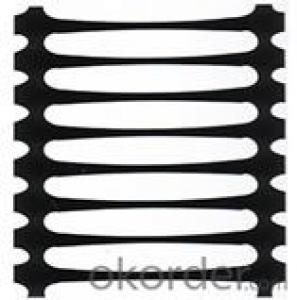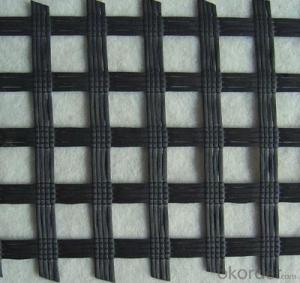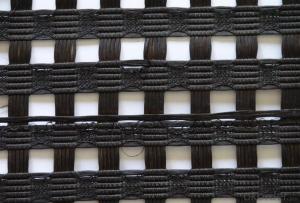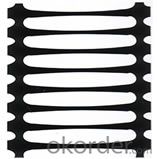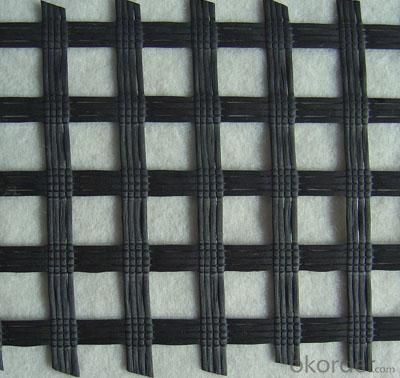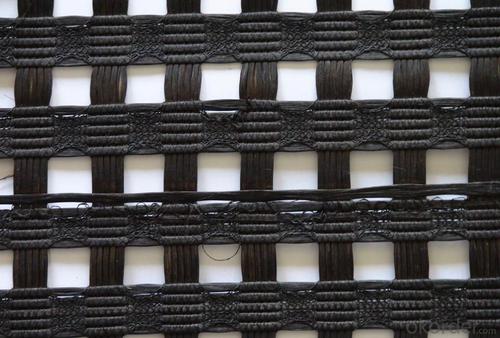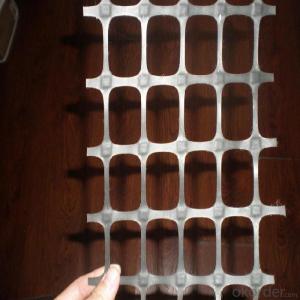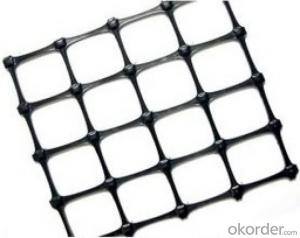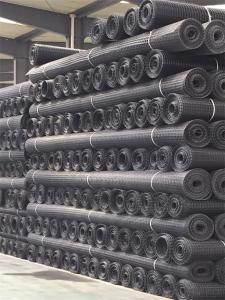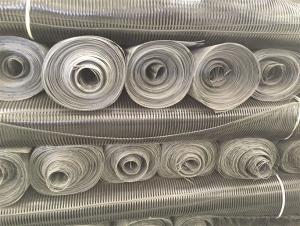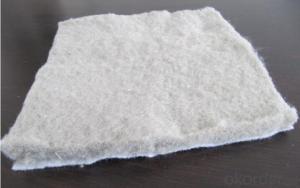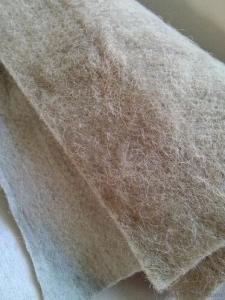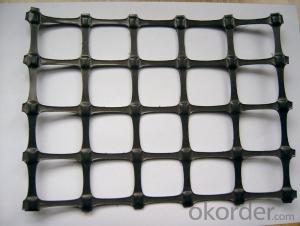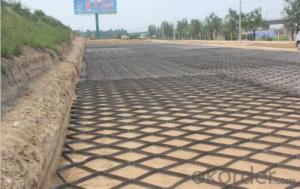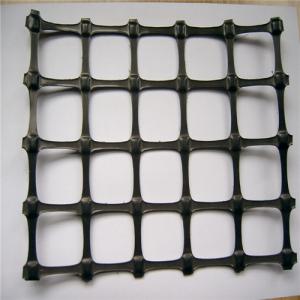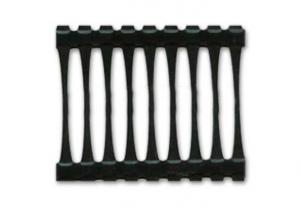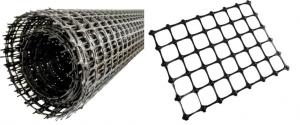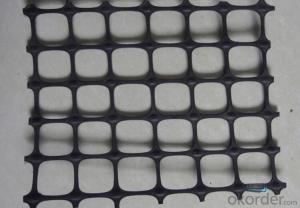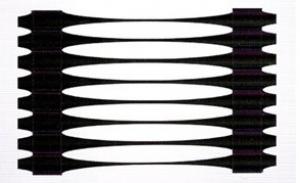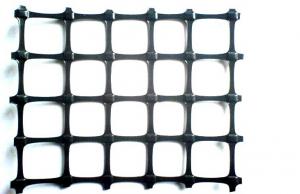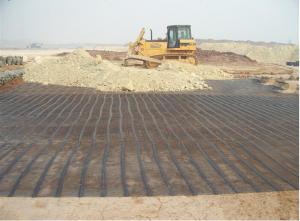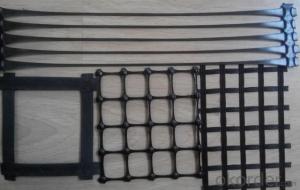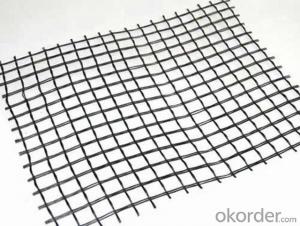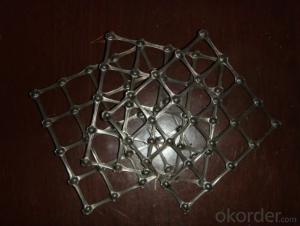Uniaxial Plastics Geo Grid Ppux 50kn/100kn/300kn Retaining Wall Enhancement
- Loading Port:
- Shanghai
- Payment Terms:
- TT OR LC
- Min Order Qty:
- 1000 m
- Supply Capability:
- 150000 m/month
OKorder Service Pledge
OKorder Financial Service
You Might Also Like
Product Introduction
Unixial geogrid is a high-strength geomaterial that uses a polymer as the main raw materials,adds a certain degree of anti-UV,anti-aging agent after stretched in one direction so as to enable the scattered
distribution of chain-shaped molecules re-oriented to lines state.Much better than the traditional or existing reinforced materials,it is a very good reinforced composite materials.
Product Features
1. Unidirectionally high tensile strength, good creep resistance, chemical nature is stable;
2. The friction coefficient with gravel is large.
Product Function
1. Uniaxial geogrid is a king of high-strength structural materials for highways, municipal roads, runways and other subgrade enhancement;
2. It is applied in the enhancement of dam rivers and sea dike;
3. It is applied in the fence of orchards, vegetable, livestock, land, etc. The use is safe and convenient, and conducive to disassembly, elegant appearance;
4. It is applied in the earth retaining and wall reinforcement works and so on;
5. It is mainly used for retaining walls, abutment, slope works an so on;
6. Retaining walls and abutment are force structure which assume all external load: the active earth pressure, the upper part of the structure of the dynamic load, temperature stress and so on, in a larger longterm reinforcement under tension, as well as the effect of repeated dynamic loading, the molecular structure of materials fatigue, occurred in the performance of attention and speed up the aging grid. In order to avoid deformation resulting from reinforcement material creep, it is better to select a high-density polyethylene (HDPE) as raw materials for one-way geogrid.
Product specifications and performance table GB/T17689-1999
Specifications/Item | TGDG25 | TGDG35 | TGDG50 | TGDG80 | TGDG110 | TGDG150 | TGDG170 | TGDG200 | TGDG220 | TGDG240 | TGDG260 | TGDG280 | TGDG300 |
The tensile yield strength of each KN/m≥ | 25 | 35 | 50 | 80 | 110 | 150 | 170 | 200 | 220 | 240 | 260 | 280 | 300 |
Yield elongation %≤ | 10 | ||||||||||||
2% elongation when tensile force KN/M ≥ | 6 | 9 | 10 | 23 | 30 | 39 | 45 | 55 | 59 | 65 | 78 | 84.5 | 90 |
5% elongation when tensile force KN/M≥ | 12 | 18 | 25 | 44 | 60 | 77 | 90 | 110 | 120 | 132 | 157 | 170 | 182 |
Creep limit strength KN/M≥ | 11 | 15 | 21 | 30.2 | 41 | 49 | 57 | 64 | 71.5 | ||||
- Q: How do geogrids improve the performance of geogrid-reinforced earth walls?
- Geogrids improve the performance of geogrid-reinforced earth walls by providing tensile strength and stabilizing the soil, which helps to prevent the wall from sliding or collapsing. They distribute the forces exerted on the wall more evenly, reducing stress concentration and increasing overall stability. Additionally, geogrids enhance drainage and soil compaction, further enhancing the wall's performance.
- Q: Product specifications and performance parameters of glass fiber grating
- Glass fiber geogrid technical parameters classification model breaking strength (KN/m) elongation at break (%) mesh size (mm * mm) width (m) meridional zonal glass fiber geogrid
- Q: Which is the most suitable for Highway Subgrade
- This depends on the Oh, you have no requirements on the design drawings, did not require the general steel plastic geogrid, plastic geogrid can be.
- Q: What is the recommended geogrid junction strength?
- The recommended geogrid junction strength depends on various factors such as the specific application, soil conditions, and design requirements. It is best to consult the geogrid manufacturer or a geotechnical engineer to determine the appropriate junction strength for a particular project.
- Q: How to ensure the quality of geogrid laying?
- , the geogrid is not the number of laying, the quality is not serious non-compliance of the event, causing the attention of the relevant departments, in the report is to assess the quality of railway construction in central and southern Shanxi:
- Q: Unidirectional tensile plastic geogrid manufacturers which good
- (1) the plastic geogrid plastic geogrid is a kind of polymer material with square or rectangular shape which is formed by stretching, and it can be used as one kind of unidirectional stretching and biaxial stretching according to the different direction of stretching in the manufacturing process. The utility model is punched on the extruded polymer plate (raw material is polypropylene or high-density polyethylene), and then directionally stretched under the heating condition
- Q: How do geogrids improve the performance of mechanically stabilized earth walls?
- Geogrids improve the performance of mechanically stabilized earth walls by providing reinforcement and enhancing stability. They act as a tension element within the soil, distributing loads and reducing stress on the wall structure. Geogrids also increase the frictional resistance between the soil layers, preventing lateral movement and potential failure. Additionally, they enhance the overall strength and durability of the wall, allowing for the construction of taller and steeper structures.
- Q: How to read geogrid grilleBe careful not to copy the dictionary. I want to know why he read it hereI look at the dictionary said: the gate of zhBlock made of bamboo, iron bars, etc.. barsIs it because geogrid can also be seen as a strip of things, so read Zha
- Normal should read Zha, but because of the dialect or engineering terminology habits, read Shan, habit, this is just a personal idea.
- Q: What are the design considerations for geogrid installation?
- Some key design considerations for geogrid installation include selecting the appropriate geogrid material and strength, determining the proper placement depth and orientation, considering soil characteristics and compaction requirements, ensuring adequate anchoring and connection methods, and accounting for potential loads and stresses that the geogrid will need to withstand. Additionally, factors such as site conditions, environmental factors, and project specifications should also be taken into account during the design process.
- Q: How long do geogrids typically last?
- Geogrids typically last for a long time, with a lifespan ranging from 20 to 100 years, depending on factors such as the type of geogrid, installation conditions, and the application it is being used for.
Send your message to us
Uniaxial Plastics Geo Grid Ppux 50kn/100kn/300kn Retaining Wall Enhancement
- Loading Port:
- Shanghai
- Payment Terms:
- TT OR LC
- Min Order Qty:
- 1000 m
- Supply Capability:
- 150000 m/month
OKorder Service Pledge
OKorder Financial Service
Similar products
Hot products
Hot Searches
Related keywords
